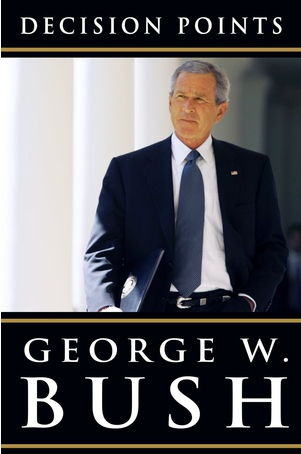Over Christmas, I took the opportunity to read former President Bush’s new book Decision Points. I did so for two reasons: first, I really wanted to “hear” what he had to say; second, as an American historian, I need to be up to speed on how this former president defends his actions.
 Let me begin with what I consider to be its strengths.
Let me begin with what I consider to be its strengths.
The first strength is Bush’s informal writing style. You get the impression this is exactly how he would express himself if you were sitting across the table from him, asking him questions. There is a personableness in the writing that is attractive. You connect with the man.
Second, I appreciate his unapologetic appeal to his Christian faith as his motivation for not only his policies but for all of his life. He does not artificially separate faith from action, personal or governmental.
Third, I highly recommend his chapters dealing with the 9/11 attacks and the subsequent War on Terror. He takes the reader through that awful day in American history as seen through the eyes of the one most responsible for an American response. One understands how difficult it was for him to know what he should do next, yet he explains clearly why he came to his decisions on how to deal with terrorism. The title of the book is appropriate. He does focus on key decisions.
Probably the most significant decision for his presidency was whether to go forward into Iraq. This chapter is a step-by-step analysis of all the twists and turns of the diplomatic thrust to avoid war, and then the rationale for finally giving the go-ahead. Bush is particularly effective in detailing the actions of Saddam and the manner in which he thumbed his nose at international law and his manifold violations of the conditions he had agreed to at the end of the Gulf War.
Bush also clearly explains why he thought WMDs existed within Iraq. He goes to great pains to document the intelligence regarding WMDs, and just as great pains to show that nearly all congressional Democrats at the time agreed with this conclusion. He includes vote tallies on the congressional resolutions that gave him permission to use the military and identifies key Democrats who favored this action—the very ones who later accused him of lying.
So, as a primer on the rationale for how to conduct a War on Terror, this book is invaluable. I highly recommend these chapters. Even some of Bush’s most vociferous critics have had to come to grips with the necessity of his policies.
It’s on the domestic side of his decisions where I have more fundamental disagreements. He does a fine job of explaining the need for tax cuts and often advocates the vitality of the free market. Yet he then goes on to offer an apologetic for why he had to interfere with the market, especially with the big bailout at the end of his presidency. He says he did it to save the market ultimately, but I don’t find his logic persuasive. I believe he allowed some of his advisors to pull him away from fundamental principles.
Neither does Bush have a great appreciation or commitment to federalism. He sees a need and wants to get the federal government involved to solve the problem: No Child Left Behind and the prescription drug bill added onto Medicare are two of the most egregious examples. While I’m sure he is fond of the Constitution, I wish he had been more devoted to following it.
So, yes, I do have criticisms of some of his decisions. Yet one can’t read this book without coming away with a sense of the basic decency of the man. That comes across repeatedly.
George Bush is coming to my university this March as part of our National Leadership Forum. I plan to be there to hear him speak, along with his former Secretary of State Condoleeza Rice. I will do so with sincere gratitude for his prosecution of a war on terror that is essential to the future of this nation. I will also do so out of respect for a Christian brother who tried to do his best in a very trying time.

